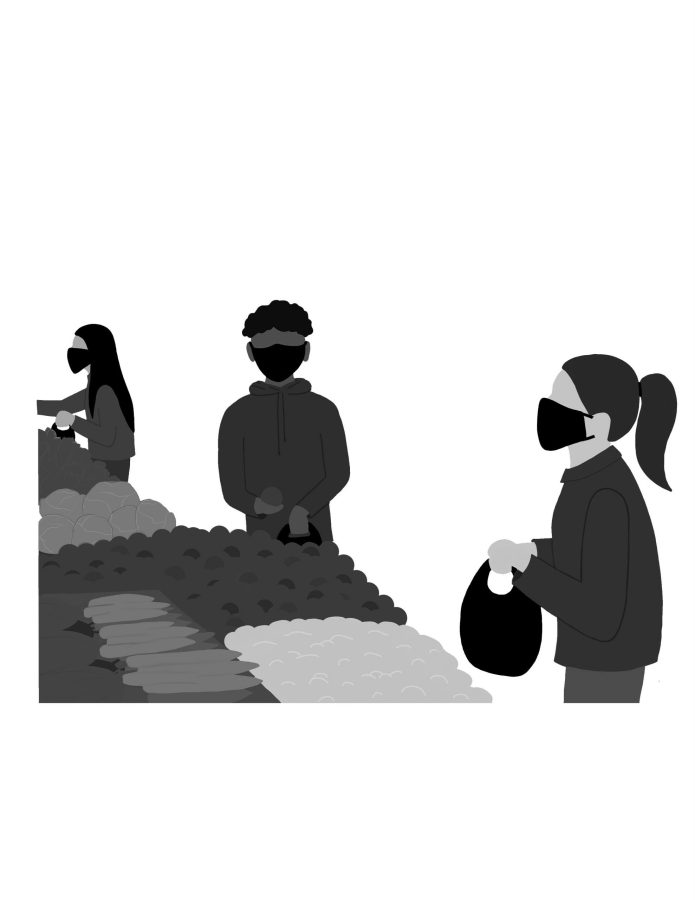Every Sunday for the past 13 years the California Avenue Farmers Market has opened up at 9 a.m. sharp, already bustling with vendors, customers, and stands dripping with produce. Even through a worldwide pandemic, the farmers market has stayed open and busy, and the vendors need customers to take the necessary precautions and return to the previous hub for the best fresh produce in the Bay Area.
In the past few months, 11 farmers markets on the peninsula have closed indefinitely and three more have gone on hiatus, with checkpoints. These checkpoints, set for every few weeks, help organizers determine if and when the markets can open again.
The farmers markets that remain are tight on stand space as a result of the strict social distancing protocols and the inability to expand into the streets. In this new game of vendor tetris, new farms are tasked with establishing themselves while sandwiched between older vendors with decades of experience.
“We haven’t been able to get into a lot of the markets that are left, even some that we have been going to since day one,” said Sam Lathrop, the fourth-generation owner of Prevedelli Farms. “We end up having to wait until a vendor sells all their goods, packs up and leaves, and then we have to sanitize the whole area and set up.”
The lack of space in the farmers markets isn’t the only major change vendors are dealing with; every farmers market now has multiple COVID-safety managers who supervise the stands and vendors, making sure everyone is following health protocols dictated by their county. Junior Josh Butler, a vendor for Far West Fungi —a mushroom farm owned and operated by his great-uncle — said market managers sometimes take enforcing these protocols too far, though.
“They’re pretty strict, and if you don’t follow the rules they’ll kick you out,” Butler said.
Butler said he thinks that for the most part, this enforcement is unnecessary, as most vendors follow the established protocols.
Both Prevedelli and Far West Fungi bag their produce ahead of time in different sized bags with set prices from $5-$15 and ____respectively; only rarely do vendors make exceptions to this process.
“Sometimes if people tell me they won’t be able to eat even the smallest bag of mushrooms, I’ll quickly bag up the amount they want, but usually we stick to our protocols,” Butler said.
Junior Eva Salvatierra, who works at Prevedelli Farms’ stand at the California Avenue Farmers Market, said Prevedelli sometimes allows customers to pick their own apples if they follow the COVID-19 regulations. Customers are required to always wear a mask, wear new gloves provided by Prevedelli on entering, and sanitize frequently.
Although Salvatierra said these guidelines are listed clearly on the large signs plastered over the stands, people don’t always follow them.
“A lot of customers don’t read the signs and then get frustrated when we don’t let them use their own gloves or reusable bags for their apples,” Salvatierra said. “We also had some issues with mask regulations and had one lady return every week with mesh tied around her face or a face shield with no mask underneath.”
After repeated requests to wear an actual mask and follow the set guidelines, Prevedelli had to get the farmers market’s managers who had to ask the woman to leave.
Phil Foster, the owner and founder of Pinnacle Farms, said there have been issues with customers not following health and safety rules at their stands as well.
“Because there were so many unknowns in the beginning of COVID-19, there were a lot of inconsistencies with customers, and because there weren’t official regulations about masks or hand-washing in late March and early April, a few customers wouldn’t feel the need to follow our rules,” Foster said. “It has also been really challenging to keep people socially distanced because we have such a limited amount of space because of the barriers between stands and the overflow of farms from closed markets.”
Although many farmers markets have closed, sales of produce for the many farms in the area have not significantly decreased. Lathrop said he sells a lot of apples with his company’s online pick-up service and at their farm stand on the weekends.
And although Far West Fungi’s sales dropped in the first few weeks of the post-COVID farmers markets, the farm experienced a spike in sales soon after which has more than made up for their momentary loss of revenue, Butler said.
Pinnacle’s sales haven’t been terribly affected by COVID either, but the decrease in open farmers markets has led to an increase of produce stored in the farms’ cold storage. There is plenty of room in the storage containers for now, but eventually, it is going to run out, and for themselves and Prevedelli, it may be sooner than later.
Luckily for Foster, his farm has the capacity to store the high volumes of excess produce created by the outbreak. Other farms, having not invested in cold storage equipment, may fare worse as they struggle to meet returning demand for their products.
“People have appeared to be more comfortable coming to the farmers markets than the grocery stores because it is open-air, which is great for us, but we aren’t going to be able to maintain our farms like this forever,” Foster said. “More markets need to open up again, and more people need to start returning.”

